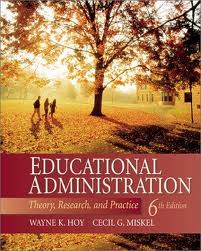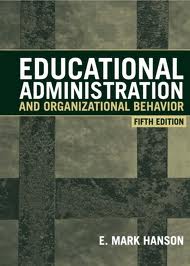Sponsored Links
Educational Administration as a Process of Management

Since organizations can be viewed as systems, management can also be defined as human action, including design, to facilitate the production of useful outcomes from a system. This view opens the opportunity to 'manage' oneself, a pre-requisite to attempting to manage others.

Four Functions of Management
The four functions of management comprise of the primary functions of managers, which must be performed efficiently for the success of an organization. These functions are common across all fields of management, be it at a factory, a super market, a restaurant or even at home. For the smooth functioning of any organization, the functions are planning, organizing, leading and controlling. These functions are referred to as the management process.
Planning
 Planning is the first and base component of management. It involves recognizing the organization’s goals and developing strategies to achieve these goals. This is called strategy planning. These strategies may have to be altered or completely changed constantly based on the macro and micro factors affecting an organization. Thus planning is a constant process. Even though all planning involves the same kind of thought process, different types of plans are made for different functions of an organization. Examples of planning are strategic planning, marketing planning, business planning, succession planning, project planning, sales planning, etc.
Planning is the first and base component of management. It involves recognizing the organization’s goals and developing strategies to achieve these goals. This is called strategy planning. These strategies may have to be altered or completely changed constantly based on the macro and micro factors affecting an organization. Thus planning is a constant process. Even though all planning involves the same kind of thought process, different types of plans are made for different functions of an organization. Examples of planning are strategic planning, marketing planning, business planning, succession planning, project planning, sales planning, etc.
Organizing
 Organizing is an important responsibility of a manager. Unless a manager manages in an organized manner, no work will get done. A manager’s organizational responsibilities include organizing the resources of an organization, identifying different roles, choosing the right people for these roles, delegating tasks to people, etc. He also has to ensure that the employees have the required resources to perform their tasks better. Inefficient organization can lead to chaos in the company.
Organizing is an important responsibility of a manager. Unless a manager manages in an organized manner, no work will get done. A manager’s organizational responsibilities include organizing the resources of an organization, identifying different roles, choosing the right people for these roles, delegating tasks to people, etc. He also has to ensure that the employees have the required resources to perform their tasks better. Inefficient organization can lead to chaos in the company.
Leading
 Even though many use the term managing and leading synonymously, nothing could be farther from the truth. Simply managing tasks means making people do their jobs. But leading means influencing and inspiring people in such a way that they feel motivated to do their jobs. People find it easier to follow a leader. Following the orders of a manager is something that is done as a part of one’s job, but following a leader is something that is done more willingly by people. Thus, every manager must aim at becoming a good leader. A leader focuses on interpersonal relations with each employee and constantly motivates them to perform better. By creating a positive working environment a leader can effectively help improve the employees’ job performance and hence their morale.
Even though many use the term managing and leading synonymously, nothing could be farther from the truth. Simply managing tasks means making people do their jobs. But leading means influencing and inspiring people in such a way that they feel motivated to do their jobs. People find it easier to follow a leader. Following the orders of a manager is something that is done as a part of one’s job, but following a leader is something that is done more willingly by people. Thus, every manager must aim at becoming a good leader. A leader focuses on interpersonal relations with each employee and constantly motivates them to perform better. By creating a positive working environment a leader can effectively help improve the employees’ job performance and hence their morale.
Controlling
 Controlling as the name suggests means controlling the various functions in the organization to ensure they are on track with the goals that were set at the beginning of the planning process. Controlling also involves setting certain performance standards for the employees and constantly evaluating their job performance. Sometimes the strategies and plans that were developed and implemented may not work out as initially planned due to certain external factors. Controlling and evaluating helps a manager recognize these failures and quickly implement corrective measures to bring the task back on track.
Controlling as the name suggests means controlling the various functions in the organization to ensure they are on track with the goals that were set at the beginning of the planning process. Controlling also involves setting certain performance standards for the employees and constantly evaluating their job performance. Sometimes the strategies and plans that were developed and implemented may not work out as initially planned due to certain external factors. Controlling and evaluating helps a manager recognize these failures and quickly implement corrective measures to bring the task back on track.
It involves evaluating the expected and actual job performance. This helps a manager recognize potential problems and take preventive measures against the consequences.
These four functions of management are very important for an organization and if done well can be the reason behind the success of the business.
The definition of management above has the following implications:
1. Function: Management implies that managers have functions to perform within organisations. Even though such functions may vary from one organisation to another, the process involved is likely to be the same. Several authors like Henri Fayol, Elton Mayo identified the five basic functions performed by management of all organizations as planning, organising, directing, coordinating and controlling. Some scholars have added budgeting, leading, communicating and educating as other functions of the manager.
2. Productivity: The essence of management is to produce. It is interesting to note that most of the enterprises whether private companies, government agencies, or educational institutions (either profit or non – profit oriented) are set up to produce either goods, product, people or services. The ultimate objective of a manager is to create surplus. In raw economic term, this is referred to as profit maximization. Management therefore would want to use people and materials very efficiently to achieve this goal.
3. General Application: Management applies to all kinds of organizations owing to the wide distribution of the enterprise which of course includes all kinds of organisations though goal might vary, materials used could be different and people within the organization may differ in age, sex, qualifications. Whatever the differences, the essence of management is to put them into efficient and effective use. Therefore, management as an organized body of knowledge provides clear insight as to how to apply management techniques to achieve organizational goals.
4. Applicable to all levels: Managements applies to all levels of organizational life. It is pertinent to observe that within each organization, there is a mapped out structure. The structure so to say depicts the organizational hierarchy. Both the structure and the hierarchy therefore depend on individual responsibilities and authorities to perform. The performance of these therefore, at any level requires management.
Interestingly, not all groups believe that they need management, but it is undisputable that management is essential in all organized cooperation as well as at all levels of organization in an enterprise.
Meaning of Administration

However, Campbell, Bridges & Nystrand (1984) said the main purpose of administration in any organization is that of coordinating the efforts of people towards the achievement of its goals. Peretomode (1991) defines administration as the performance of executive duties, the carrying out of policies or decisions to fulfill a purpose, and the controlling of the day-to-day running of an organization.
From all the above, administration is a process and it is sometimes used synonymously with management. Beach (1975) corroborate the statement by saying that administration is a part of management which is concerned with the installation and carrying out of the procedures by which programs, plans and targets are laid down and communicated, and the progress of activities regulated and checked against them. Administration may be defined as a process of coordinating human and material resources in order to achieve organizational goals.
3.3 Meaning of Educational Administration

The concept of educational administration may not be totally different from what we are familiar with in the concept of administration. Education at different levels has its objectives, the most important of the objectives that cut across all the levels of education is teaching and learning. It is the function of the school to produce educated and enlightened human beings who would be able to contribute positively to the development of the society. This formed the opinion of Olaniyi (2000) who describes school as a social institution which does not exist in a vacuum. He said further that a school is a micro-community, existing within a macro community to mould the habits, interest, attitudes and feelings of children and transmit from one generation to another. The school also comprises certain personnel i.e. teaching and non-teaching staff as well as the students. These human resources in the school work with some materials, such as instructional materials, equipment, and financial resources in order to achieve the objectives of the school.
Administration is very germane to the realization of the school’s objectives – indeed, the success of the school system depends largely on the administration of the school it handled.
 The teachers, students, non-teaching staff and resources must be efficiently arranged, monitored and controlled, so that they would work harmoniously according to (educational plan). Even the National Policy on Education emphasizes the success of the entire educational system on proper planning, efficient administration and adequate funding. School administration is the process by which principles, methods and practices of administration are applied in educational institutions to establish, maintain and develop such institutions in line with the goals of the institutions. Akinwumi & Jayeoba (2004) define school administration as the scientific organization of human and material resources and programs available for education and using them systematically and meticulously to achieve educational goals.
The teachers, students, non-teaching staff and resources must be efficiently arranged, monitored and controlled, so that they would work harmoniously according to (educational plan). Even the National Policy on Education emphasizes the success of the entire educational system on proper planning, efficient administration and adequate funding. School administration is the process by which principles, methods and practices of administration are applied in educational institutions to establish, maintain and develop such institutions in line with the goals of the institutions. Akinwumi & Jayeoba (2004) define school administration as the scientific organization of human and material resources and programs available for education and using them systematically and meticulously to achieve educational goals.
Basically, educational administration implies the arrangement of the human and material resources and program available for education and carefully using them systematically for the achievement of educational objectives.
 Thus educational administrator, whether in the ministry of education, the schools board, or in a school is essentially the organizer, the implementer of plans, policies and program meant for achieving specific educational objectives. The educational administrator may contribute, one way or the other, in planning, policy–making and program designing, yet his major role rests with the effective and efficient implementation of such plans, policies and program for the benefit of education. Viewed from this angle, educational administration is concerned with organization and implementation – it may be categorized under broad areas of:
Thus educational administrator, whether in the ministry of education, the schools board, or in a school is essentially the organizer, the implementer of plans, policies and program meant for achieving specific educational objectives. The educational administrator may contribute, one way or the other, in planning, policy–making and program designing, yet his major role rests with the effective and efficient implementation of such plans, policies and program for the benefit of education. Viewed from this angle, educational administration is concerned with organization and implementation – it may be categorized under broad areas of:- Planning and Policy
-
Implementation
Functions of School Administrators

The function of the school administrators could be summarized as follows:
-
production and management of resources (human and materials) needed to support organizations and its program
-
supervision of instructional activities in the school system
-
obtaining and training personnel
-
providing leadership for curriculum
-
maintaining peaceful co-existence between the school, the community and the external agencies
-
influencing staff behavior
-
discerning and influencing the development of goals and policies
-
evaluating the effectiveness and efficiency or otherwise of the school
-
initiating work activities
-
grouping the tasks into activities
-
defining the task to be done
-
taking remedial action if the objectives are not being met
-
supplying incentives to stimulate productivity.
Some differences between administration and management
 1) The difference between administration and management is rather very thin. However while management is the process of working with and through groups or individuals to accomplish organizational goals, administration is concerned with directing and controlling life in a social system.
1) The difference between administration and management is rather very thin. However while management is the process of working with and through groups or individuals to accomplish organizational goals, administration is concerned with directing and controlling life in a social system. Educational administration and educational management

According to Okumbe (1999), educational administration is a process of acquiring and allocating resources for the achievement of predetermined educational goals. Educational administration is the operation and management of learning institutions such as public schools, child care centers, colleges and universities. From small preschools to prestigious universities, educational administrators manage organizational structure, administrative processes and educational programming. Because it involves children, educational administration contains a wide range of ethical standards and customary practices.
 1. “Educational administration as a process of management”, means, among others, that one of educational administration's key to success is practicing at least the basic processes and principles in management like operating through functions such as planning, organizing, staffing, leading/directing, controlling/monitoring and motivation.
1. “Educational administration as a process of management”, means, among others, that one of educational administration's key to success is practicing at least the basic processes and principles in management like operating through functions such as planning, organizing, staffing, leading/directing, controlling/monitoring and motivation. 2. eHow.com defines ‘educational administration’ as “the operation and management of learning institutions such as public schools, child care centers, colleges and universities. From small preschools to prestigious universities, educational administrators manage organizational structure, administrative processes and educational programming... educational administration contains a wide range of ethical standards and customary practices.”
2. eHow.com defines ‘educational administration’ as “the operation and management of learning institutions such as public schools, child care centers, colleges and universities. From small preschools to prestigious universities, educational administrators manage organizational structure, administrative processes and educational programming... educational administration contains a wide range of ethical standards and customary practices.” 3. As de facto managers, educational administrators must perform the manager’s three (3) basic roles:
3. As de facto managers, educational administrators must perform the manager’s three (3) basic roles:-
Interpersonal: roles that involve coordination and interaction with employees.
-
Informational: roles that involve handling, sharing, and analyzing information.
-
Decisional: roles that require decision-making.
 4. To do well as educational administrator, one has to acquire and demonstrate the management skills:
4. To do well as educational administrator, one has to acquire and demonstrate the management skills:-
Technical: used for specialized knowledge required for work.
-
Political: used to build a power base and establish connections.
-
Conceptual: used to analyze complex situations.
-
Interpersonal: used to communicate, motivate, mentor and delegate.
-
Diagnostic: ability to visualise most appropriate response to a situation.
5. Some scholars explain that administration and management are terms that connote stability through the exercise of control and supervision. However, the concept of leadership, scholars say, is now favored because it conveys dynamism and pro-activity. Applied to education, school leadership is submitted as the process of enlisting and guiding the talents and energies of teachers, pupils, and parents toward achieving common educational aims.






Add new comment